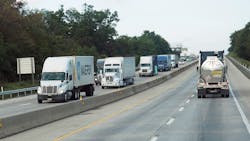Study: 3PLs continue to offer value, with technology the key
Three out of four users of third-party logistics (3PL) services said 3PLs improve logistics effectiveness in "new and innovative ways," a new study found. Shippers are also looking to 3PLs more to provide needed IT services, even as fewer shippers — 56% this year vs. 65% in last year's study — indicated they're satisfied with their IT services.
Examining those IT services more closely, shippers most frequently are looking for 3PLs to handle warehouse and distribution center management, transportation management and data visibility of things like orders, shipments and inventory.
The findings come from the 2018 Third-Party Logistics Study: The State of Logistics Outsourcing. It's the 22nd of its kind, and the original was initiated by Dr. C. John Langley, clinical professor of supply chain and information systems for the Pennsylvania State University's Smeal College Business Center for Supply Chain Research.
Most 3PL users, about eight out of 10, agreed that 3PLs improve services for end customers, according to this latest study. Perhaps not surprisingly, nearly 100% of 3PLs expressed that belief.
Smoothing out disruption
A key part of the 3PL value proposition comes back to IT and data accessibility. Shippers look to 3PLs to provide more flexibility and resilience to deal with supply chain disruptions, the study found, and "real-time problems demand real-time solutions." Shipper and 3PL respondents in the study pointed to the need for increased supply chain visibility and the ability to take action is real time to adjust for problems as they occur.
The study identified blockchain technology as a potential contributor to 3PL services going forward. That technology uses a third party to create "blocks" of documentation whenever a shipment changes hands. Each of those records is protected and any edits to it have to come from all parties involved, so the "blockchain" of authenticated records could increase visibility and security of shipments.
Why is that important? Interest in real-time info is increasing, the study noted, and blockchain technology could give insight into inventories and help enable more dynamic supply chains, for one thing.
Still, it's a future technology in a "nascent" stage and needs more development. "Currently there doesn't appear to be an easily defined value proposition for all products" with blockchain tech, the study authors wrote.
Other change drivers in supply chain logistics include automation and digitization in the transport of goods. Boiling it down, "data-driven decision making is the key to increase asset utilization, improve efficiency and decrease volatility," the study stated.
Shippers and 3PLs acknowledge that point, and "large numbers" of both are planning additional investments in big data technology. And meanwhile, the amount of technology going into and being used on Class 8 trucks has been increasing, the study added.
Technology: Boon or bust
The study cited currently available truck technology such as adaptive cruise control, collision mitigation systems and telematics. Heavy truck technology in the pipeline includes things like self-driving trucks and auto-docking functionality.
And such technology offers not only potential benefits but problems as well. For example, truck technology increases supply chain visibility and potential to use and access data along with trucks that are easier to drive, possibly with fewer mishaps.
At the same time, the rapid pace at which some technology is developing makes adoption difficult, since investments can quickly become obsolete — particularly on a fleet purchase cycle of several years or more.
The top three services that shippers outsource to 3PLs were domestic transportation (83%), warehousing (66%) and international transportation (63%).
Notably, with all this as a backdrop, the study found that 3PL revenues have dropped in many areas around the globe. In 2016 vs. 2013, 3PL revenues declined in Europe, Africa, Russia, the Middle East and South America.
Brighter spots for 3PLs over that same period included North America, where their collective revenue was $184.7 billion in 2013 and $199.6 billion in 2016, and the Asia-Pacific region, where 3PL revenues totaled $278.2 billion in 2013 and 305.0 billion in 2016.
The complete study is available at www.3plstudy.com.
About the Author
Aaron Marsh
Aaron Marsh is a former senior editor of FleetOwner, who wrote for the publication from 2015 to 2019.
